HR and Management Strategies at Deliveroo: A Comprehensive Case Study
VerifiedAdded on 2022/09/01
|13
|2977
|21
Case Study
AI Summary
This report presents a case study of Deliveroo, focusing on its human resource practices. The study analyzes Deliveroo's approach to HR, comparing universalist and contingency theories, and examining the psychological contracts within the organization. It explores how Deliveroo, operating in the gig economy, treats its riders as contractors and the implications of this approach. The report discusses the flexibility Deliveroo employs to manage its workforce, the legal battles it has faced, and the benefits provided to riders. Additionally, it delves into the concept of psychological contracts, the expectations between Deliveroo and its riders, and the different categories of workers within the organization. The analysis highlights the challenges of managing a flexible workforce and the impact of these practices on the overall business operations, including the use of surge pricing and incentives.
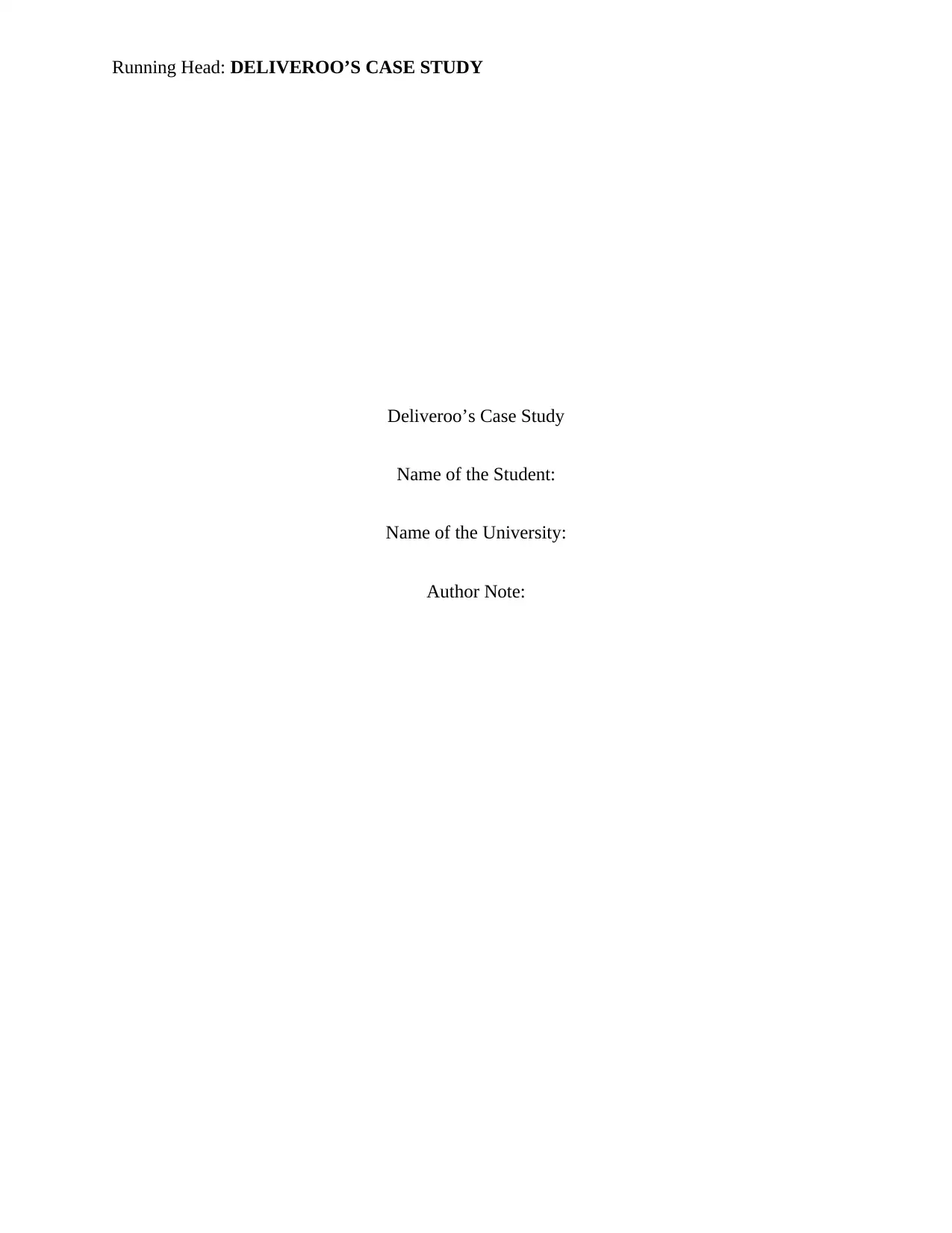
Running Head: DELIVEROO’S CASE STUDY
Deliveroo’s Case Study
Name of the Student:
Name of the University:
Author Note:
Deliveroo’s Case Study
Name of the Student:
Name of the University:
Author Note:
Paraphrase This Document
Need a fresh take? Get an instant paraphrase of this document with our AI Paraphraser
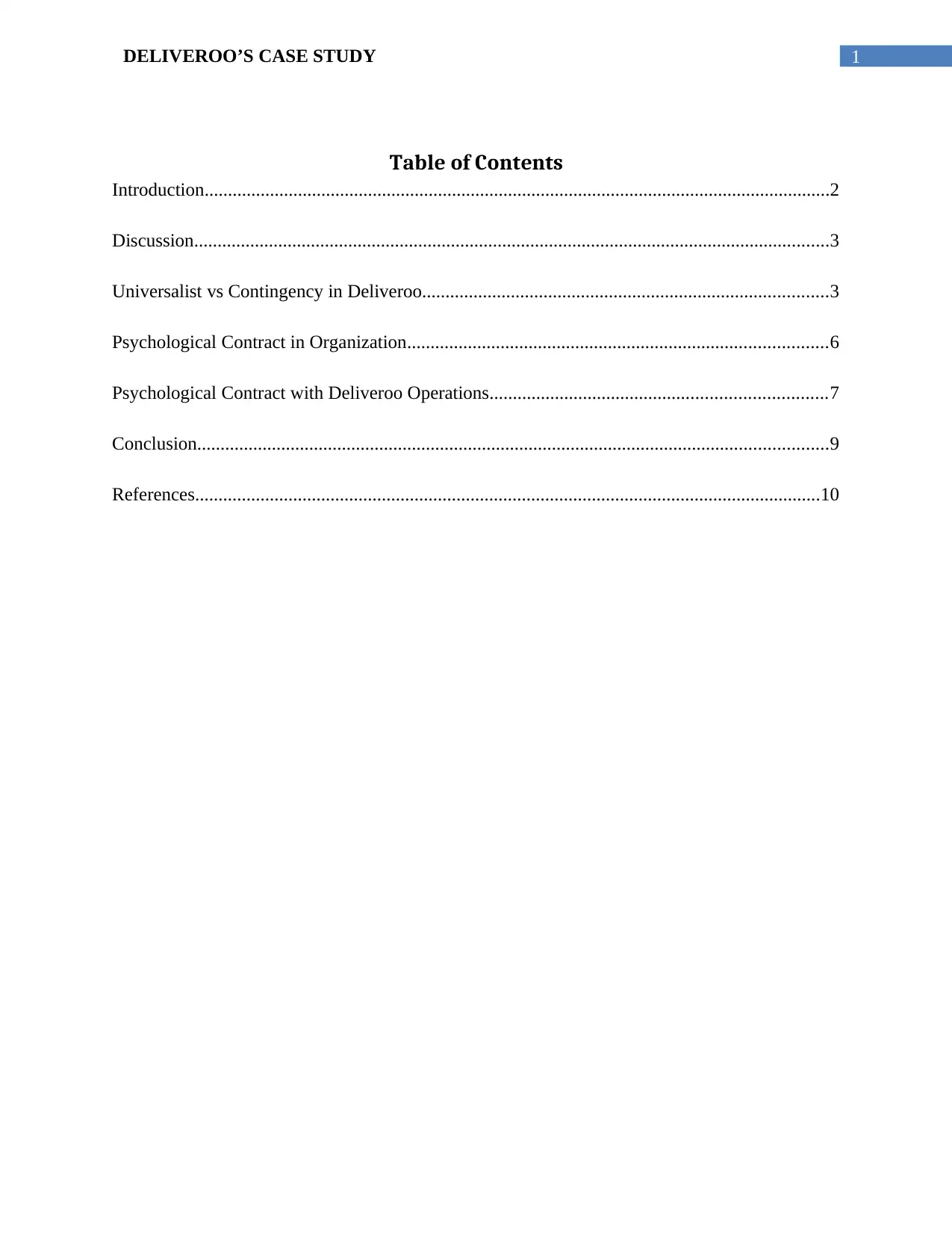
1DELIVEROO’S CASE STUDY
Table of Contents
Introduction......................................................................................................................................2
Discussion........................................................................................................................................3
Universalist vs Contingency in Deliveroo.......................................................................................3
Psychological Contract in Organization..........................................................................................6
Psychological Contract with Deliveroo Operations........................................................................7
Conclusion.......................................................................................................................................9
References......................................................................................................................................10
Table of Contents
Introduction......................................................................................................................................2
Discussion........................................................................................................................................3
Universalist vs Contingency in Deliveroo.......................................................................................3
Psychological Contract in Organization..........................................................................................6
Psychological Contract with Deliveroo Operations........................................................................7
Conclusion.......................................................................................................................................9
References......................................................................................................................................10
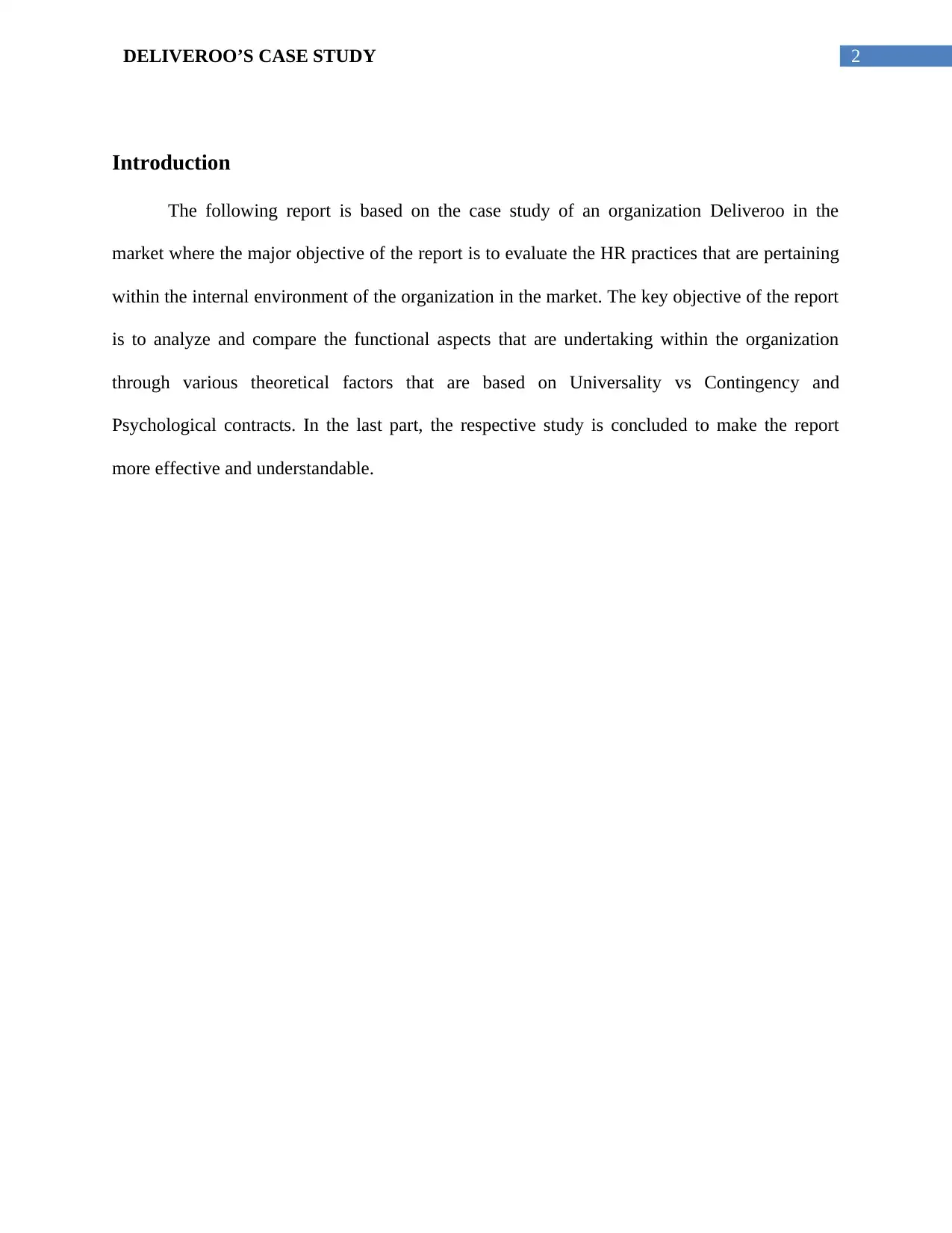
2DELIVEROO’S CASE STUDY
Introduction
The following report is based on the case study of an organization Deliveroo in the
market where the major objective of the report is to evaluate the HR practices that are pertaining
within the internal environment of the organization in the market. The key objective of the report
is to analyze and compare the functional aspects that are undertaking within the organization
through various theoretical factors that are based on Universality vs Contingency and
Psychological contracts. In the last part, the respective study is concluded to make the report
more effective and understandable.
Introduction
The following report is based on the case study of an organization Deliveroo in the
market where the major objective of the report is to evaluate the HR practices that are pertaining
within the internal environment of the organization in the market. The key objective of the report
is to analyze and compare the functional aspects that are undertaking within the organization
through various theoretical factors that are based on Universality vs Contingency and
Psychological contracts. In the last part, the respective study is concluded to make the report
more effective and understandable.
⊘ This is a preview!⊘
Do you want full access?
Subscribe today to unlock all pages.

Trusted by 1+ million students worldwide
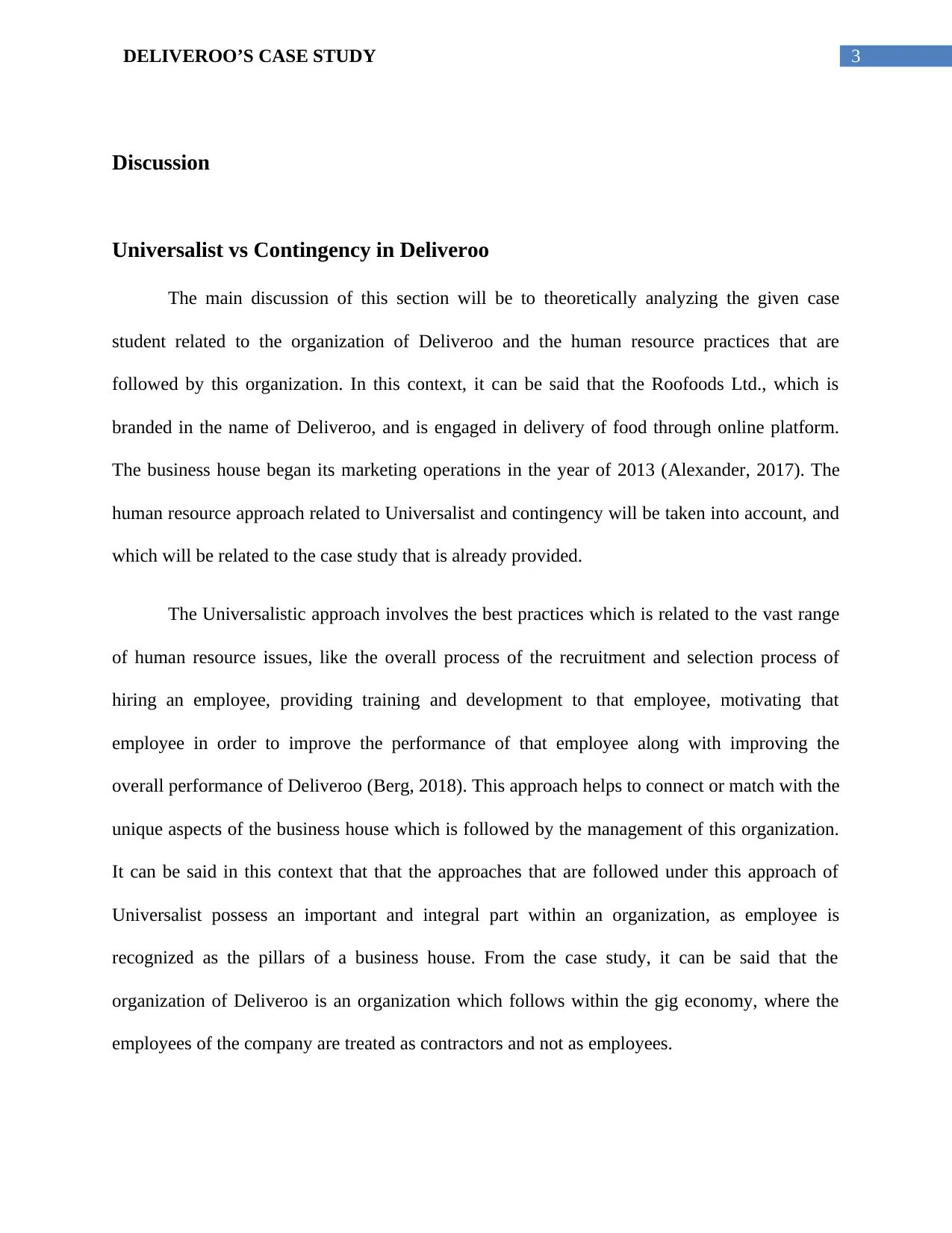
3DELIVEROO’S CASE STUDY
Discussion
Universalist vs Contingency in Deliveroo
The main discussion of this section will be to theoretically analyzing the given case
student related to the organization of Deliveroo and the human resource practices that are
followed by this organization. In this context, it can be said that the Roofoods Ltd., which is
branded in the name of Deliveroo, and is engaged in delivery of food through online platform.
The business house began its marketing operations in the year of 2013 (Alexander, 2017). The
human resource approach related to Universalist and contingency will be taken into account, and
which will be related to the case study that is already provided.
The Universalistic approach involves the best practices which is related to the vast range
of human resource issues, like the overall process of the recruitment and selection process of
hiring an employee, providing training and development to that employee, motivating that
employee in order to improve the performance of that employee along with improving the
overall performance of Deliveroo (Berg, 2018). This approach helps to connect or match with the
unique aspects of the business house which is followed by the management of this organization.
It can be said in this context that that the approaches that are followed under this approach of
Universalist possess an important and integral part within an organization, as employee is
recognized as the pillars of a business house. From the case study, it can be said that the
organization of Deliveroo is an organization which follows within the gig economy, where the
employees of the company are treated as contractors and not as employees.
Discussion
Universalist vs Contingency in Deliveroo
The main discussion of this section will be to theoretically analyzing the given case
student related to the organization of Deliveroo and the human resource practices that are
followed by this organization. In this context, it can be said that the Roofoods Ltd., which is
branded in the name of Deliveroo, and is engaged in delivery of food through online platform.
The business house began its marketing operations in the year of 2013 (Alexander, 2017). The
human resource approach related to Universalist and contingency will be taken into account, and
which will be related to the case study that is already provided.
The Universalistic approach involves the best practices which is related to the vast range
of human resource issues, like the overall process of the recruitment and selection process of
hiring an employee, providing training and development to that employee, motivating that
employee in order to improve the performance of that employee along with improving the
overall performance of Deliveroo (Berg, 2018). This approach helps to connect or match with the
unique aspects of the business house which is followed by the management of this organization.
It can be said in this context that that the approaches that are followed under this approach of
Universalist possess an important and integral part within an organization, as employee is
recognized as the pillars of a business house. From the case study, it can be said that the
organization of Deliveroo is an organization which follows within the gig economy, where the
employees of the company are treated as contractors and not as employees.
Paraphrase This Document
Need a fresh take? Get an instant paraphrase of this document with our AI Paraphraser
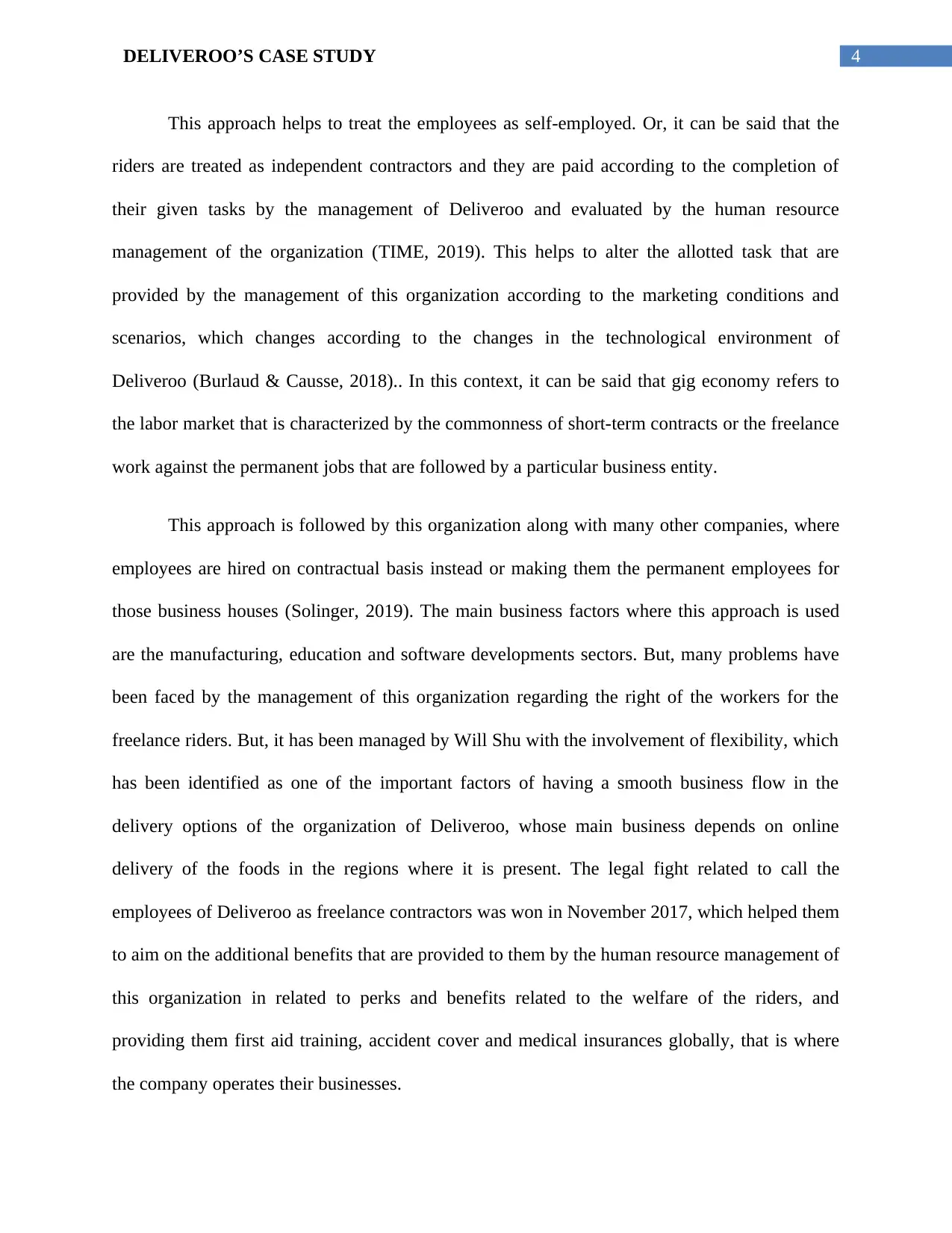
4DELIVEROO’S CASE STUDY
This approach helps to treat the employees as self-employed. Or, it can be said that the
riders are treated as independent contractors and they are paid according to the completion of
their given tasks by the management of Deliveroo and evaluated by the human resource
management of the organization (TIME, 2019). This helps to alter the allotted task that are
provided by the management of this organization according to the marketing conditions and
scenarios, which changes according to the changes in the technological environment of
Deliveroo (Burlaud & Causse, 2018).. In this context, it can be said that gig economy refers to
the labor market that is characterized by the commonness of short-term contracts or the freelance
work against the permanent jobs that are followed by a particular business entity.
This approach is followed by this organization along with many other companies, where
employees are hired on contractual basis instead or making them the permanent employees for
those business houses (Solinger, 2019). The main business factors where this approach is used
are the manufacturing, education and software developments sectors. But, many problems have
been faced by the management of this organization regarding the right of the workers for the
freelance riders. But, it has been managed by Will Shu with the involvement of flexibility, which
has been identified as one of the important factors of having a smooth business flow in the
delivery options of the organization of Deliveroo, whose main business depends on online
delivery of the foods in the regions where it is present. The legal fight related to call the
employees of Deliveroo as freelance contractors was won in November 2017, which helped them
to aim on the additional benefits that are provided to them by the human resource management of
this organization in related to perks and benefits related to the welfare of the riders, and
providing them first aid training, accident cover and medical insurances globally, that is where
the company operates their businesses.
This approach helps to treat the employees as self-employed. Or, it can be said that the
riders are treated as independent contractors and they are paid according to the completion of
their given tasks by the management of Deliveroo and evaluated by the human resource
management of the organization (TIME, 2019). This helps to alter the allotted task that are
provided by the management of this organization according to the marketing conditions and
scenarios, which changes according to the changes in the technological environment of
Deliveroo (Burlaud & Causse, 2018).. In this context, it can be said that gig economy refers to
the labor market that is characterized by the commonness of short-term contracts or the freelance
work against the permanent jobs that are followed by a particular business entity.
This approach is followed by this organization along with many other companies, where
employees are hired on contractual basis instead or making them the permanent employees for
those business houses (Solinger, 2019). The main business factors where this approach is used
are the manufacturing, education and software developments sectors. But, many problems have
been faced by the management of this organization regarding the right of the workers for the
freelance riders. But, it has been managed by Will Shu with the involvement of flexibility, which
has been identified as one of the important factors of having a smooth business flow in the
delivery options of the organization of Deliveroo, whose main business depends on online
delivery of the foods in the regions where it is present. The legal fight related to call the
employees of Deliveroo as freelance contractors was won in November 2017, which helped them
to aim on the additional benefits that are provided to them by the human resource management of
this organization in related to perks and benefits related to the welfare of the riders, and
providing them first aid training, accident cover and medical insurances globally, that is where
the company operates their businesses.
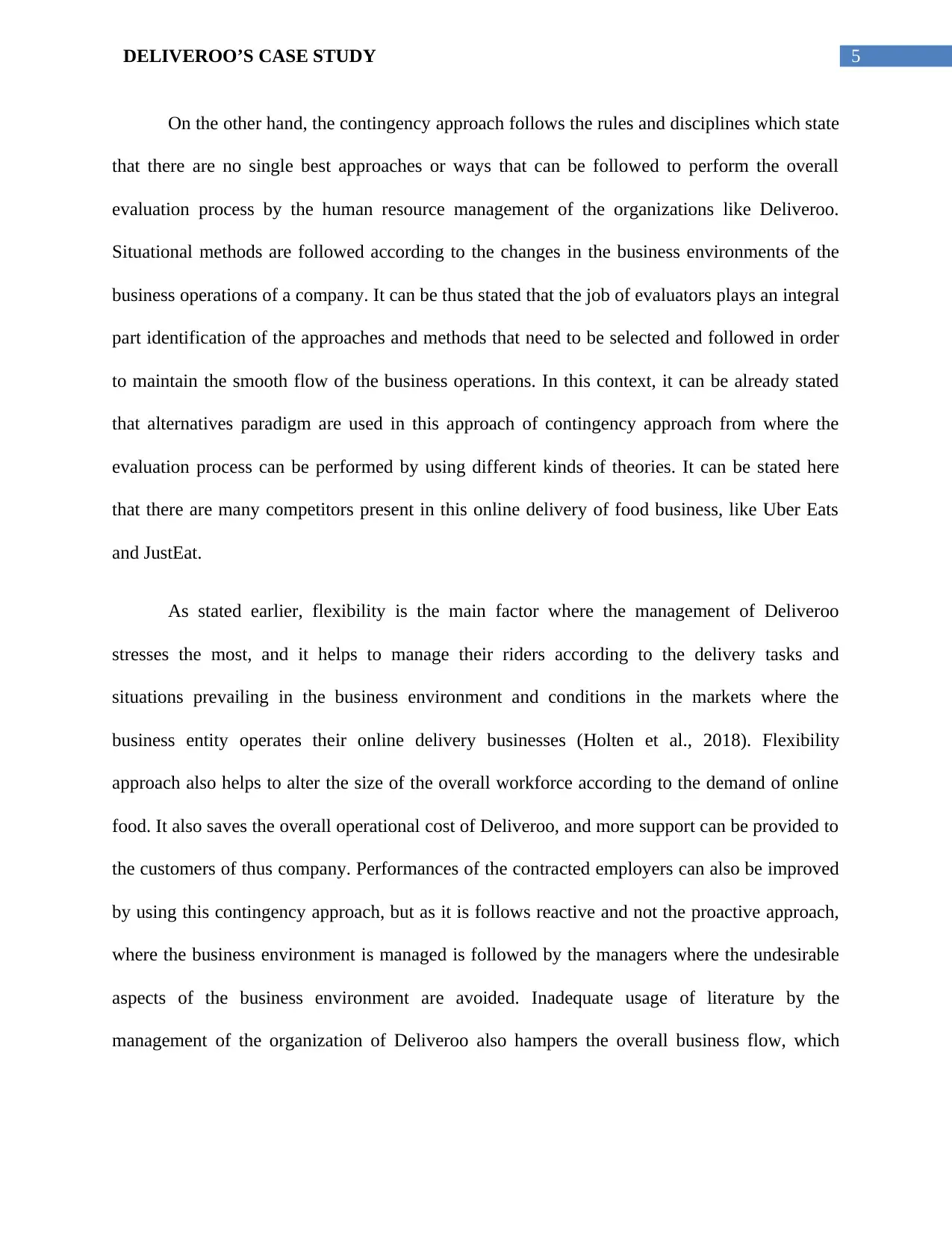
5DELIVEROO’S CASE STUDY
On the other hand, the contingency approach follows the rules and disciplines which state
that there are no single best approaches or ways that can be followed to perform the overall
evaluation process by the human resource management of the organizations like Deliveroo.
Situational methods are followed according to the changes in the business environments of the
business operations of a company. It can be thus stated that the job of evaluators plays an integral
part identification of the approaches and methods that need to be selected and followed in order
to maintain the smooth flow of the business operations. In this context, it can be already stated
that alternatives paradigm are used in this approach of contingency approach from where the
evaluation process can be performed by using different kinds of theories. It can be stated here
that there are many competitors present in this online delivery of food business, like Uber Eats
and JustEat.
As stated earlier, flexibility is the main factor where the management of Deliveroo
stresses the most, and it helps to manage their riders according to the delivery tasks and
situations prevailing in the business environment and conditions in the markets where the
business entity operates their online delivery businesses (Holten et al., 2018). Flexibility
approach also helps to alter the size of the overall workforce according to the demand of online
food. It also saves the overall operational cost of Deliveroo, and more support can be provided to
the customers of thus company. Performances of the contracted employers can also be improved
by using this contingency approach, but as it is follows reactive and not the proactive approach,
where the business environment is managed is followed by the managers where the undesirable
aspects of the business environment are avoided. Inadequate usage of literature by the
management of the organization of Deliveroo also hampers the overall business flow, which
On the other hand, the contingency approach follows the rules and disciplines which state
that there are no single best approaches or ways that can be followed to perform the overall
evaluation process by the human resource management of the organizations like Deliveroo.
Situational methods are followed according to the changes in the business environments of the
business operations of a company. It can be thus stated that the job of evaluators plays an integral
part identification of the approaches and methods that need to be selected and followed in order
to maintain the smooth flow of the business operations. In this context, it can be already stated
that alternatives paradigm are used in this approach of contingency approach from where the
evaluation process can be performed by using different kinds of theories. It can be stated here
that there are many competitors present in this online delivery of food business, like Uber Eats
and JustEat.
As stated earlier, flexibility is the main factor where the management of Deliveroo
stresses the most, and it helps to manage their riders according to the delivery tasks and
situations prevailing in the business environment and conditions in the markets where the
business entity operates their online delivery businesses (Holten et al., 2018). Flexibility
approach also helps to alter the size of the overall workforce according to the demand of online
food. It also saves the overall operational cost of Deliveroo, and more support can be provided to
the customers of thus company. Performances of the contracted employers can also be improved
by using this contingency approach, but as it is follows reactive and not the proactive approach,
where the business environment is managed is followed by the managers where the undesirable
aspects of the business environment are avoided. Inadequate usage of literature by the
management of the organization of Deliveroo also hampers the overall business flow, which
⊘ This is a preview!⊘
Do you want full access?
Subscribe today to unlock all pages.

Trusted by 1+ million students worldwide
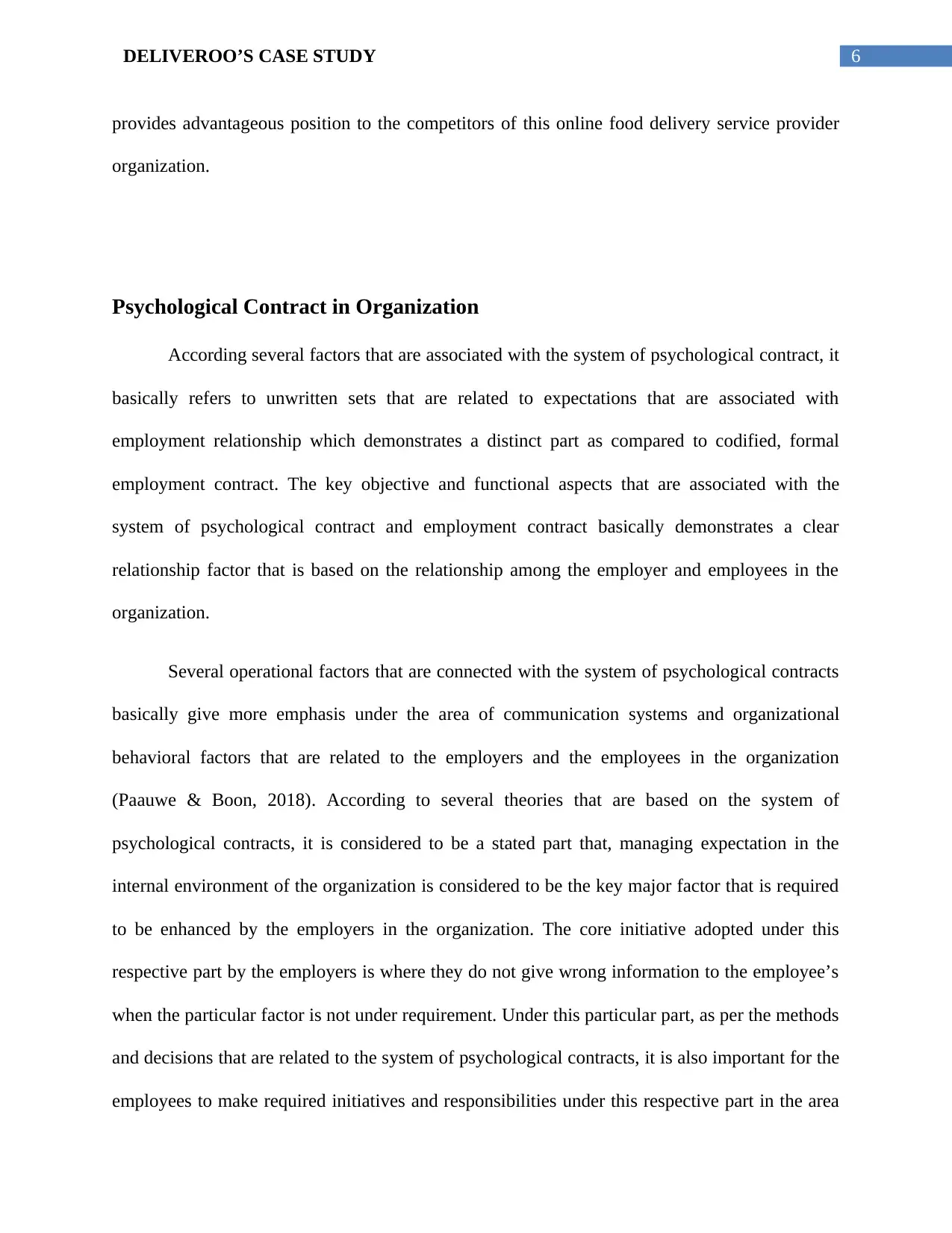
6DELIVEROO’S CASE STUDY
provides advantageous position to the competitors of this online food delivery service provider
organization.
Psychological Contract in Organization
According several factors that are associated with the system of psychological contract, it
basically refers to unwritten sets that are related to expectations that are associated with
employment relationship which demonstrates a distinct part as compared to codified, formal
employment contract. The key objective and functional aspects that are associated with the
system of psychological contract and employment contract basically demonstrates a clear
relationship factor that is based on the relationship among the employer and employees in the
organization.
Several operational factors that are connected with the system of psychological contracts
basically give more emphasis under the area of communication systems and organizational
behavioral factors that are related to the employers and the employees in the organization
(Paauwe & Boon, 2018). According to several theories that are based on the system of
psychological contracts, it is considered to be a stated part that, managing expectation in the
internal environment of the organization is considered to be the key major factor that is required
to be enhanced by the employers in the organization. The core initiative adopted under this
respective part by the employers is where they do not give wrong information to the employee’s
when the particular factor is not under requirement. Under this particular part, as per the methods
and decisions that are related to the system of psychological contracts, it is also important for the
employees to make required initiatives and responsibilities under this respective part in the area
provides advantageous position to the competitors of this online food delivery service provider
organization.
Psychological Contract in Organization
According several factors that are associated with the system of psychological contract, it
basically refers to unwritten sets that are related to expectations that are associated with
employment relationship which demonstrates a distinct part as compared to codified, formal
employment contract. The key objective and functional aspects that are associated with the
system of psychological contract and employment contract basically demonstrates a clear
relationship factor that is based on the relationship among the employer and employees in the
organization.
Several operational factors that are connected with the system of psychological contracts
basically give more emphasis under the area of communication systems and organizational
behavioral factors that are related to the employers and the employees in the organization
(Paauwe & Boon, 2018). According to several theories that are based on the system of
psychological contracts, it is considered to be a stated part that, managing expectation in the
internal environment of the organization is considered to be the key major factor that is required
to be enhanced by the employers in the organization. The core initiative adopted under this
respective part by the employers is where they do not give wrong information to the employee’s
when the particular factor is not under requirement. Under this particular part, as per the methods
and decisions that are related to the system of psychological contracts, it is also important for the
employees to make required initiatives and responsibilities under this respective part in the area
Paraphrase This Document
Need a fresh take? Get an instant paraphrase of this document with our AI Paraphraser
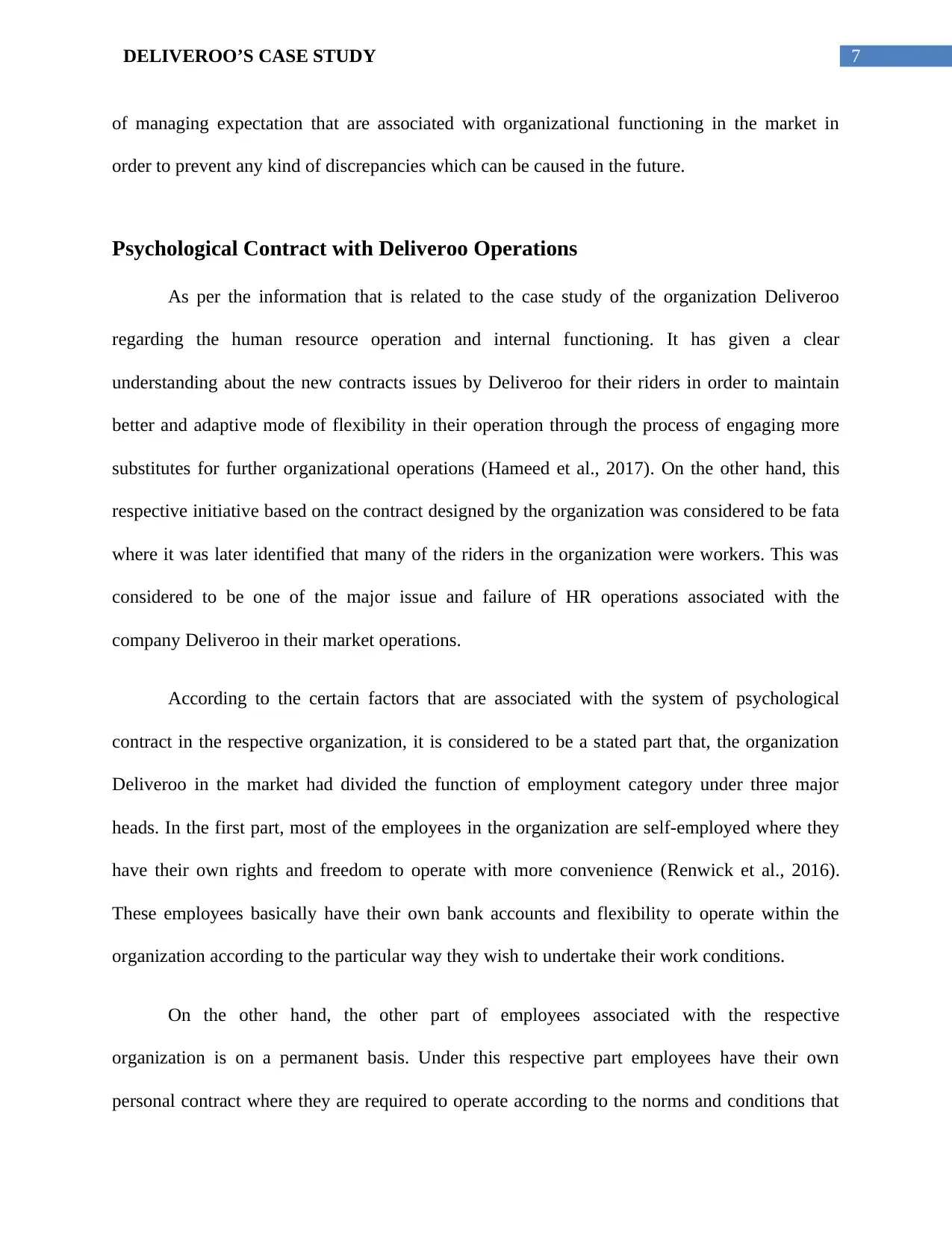
7DELIVEROO’S CASE STUDY
of managing expectation that are associated with organizational functioning in the market in
order to prevent any kind of discrepancies which can be caused in the future.
Psychological Contract with Deliveroo Operations
As per the information that is related to the case study of the organization Deliveroo
regarding the human resource operation and internal functioning. It has given a clear
understanding about the new contracts issues by Deliveroo for their riders in order to maintain
better and adaptive mode of flexibility in their operation through the process of engaging more
substitutes for further organizational operations (Hameed et al., 2017). On the other hand, this
respective initiative based on the contract designed by the organization was considered to be fata
where it was later identified that many of the riders in the organization were workers. This was
considered to be one of the major issue and failure of HR operations associated with the
company Deliveroo in their market operations.
According to the certain factors that are associated with the system of psychological
contract in the respective organization, it is considered to be a stated part that, the organization
Deliveroo in the market had divided the function of employment category under three major
heads. In the first part, most of the employees in the organization are self-employed where they
have their own rights and freedom to operate with more convenience (Renwick et al., 2016).
These employees basically have their own bank accounts and flexibility to operate within the
organization according to the particular way they wish to undertake their work conditions.
On the other hand, the other part of employees associated with the respective
organization is on a permanent basis. Under this respective part employees have their own
personal contract where they are required to operate according to the norms and conditions that
of managing expectation that are associated with organizational functioning in the market in
order to prevent any kind of discrepancies which can be caused in the future.
Psychological Contract with Deliveroo Operations
As per the information that is related to the case study of the organization Deliveroo
regarding the human resource operation and internal functioning. It has given a clear
understanding about the new contracts issues by Deliveroo for their riders in order to maintain
better and adaptive mode of flexibility in their operation through the process of engaging more
substitutes for further organizational operations (Hameed et al., 2017). On the other hand, this
respective initiative based on the contract designed by the organization was considered to be fata
where it was later identified that many of the riders in the organization were workers. This was
considered to be one of the major issue and failure of HR operations associated with the
company Deliveroo in their market operations.
According to the certain factors that are associated with the system of psychological
contract in the respective organization, it is considered to be a stated part that, the organization
Deliveroo in the market had divided the function of employment category under three major
heads. In the first part, most of the employees in the organization are self-employed where they
have their own rights and freedom to operate with more convenience (Renwick et al., 2016).
These employees basically have their own bank accounts and flexibility to operate within the
organization according to the particular way they wish to undertake their work conditions.
On the other hand, the other part of employees associated with the respective
organization is on a permanent basis. Under this respective part employees have their own
personal contract where they are required to operate according to the norms and conditions that
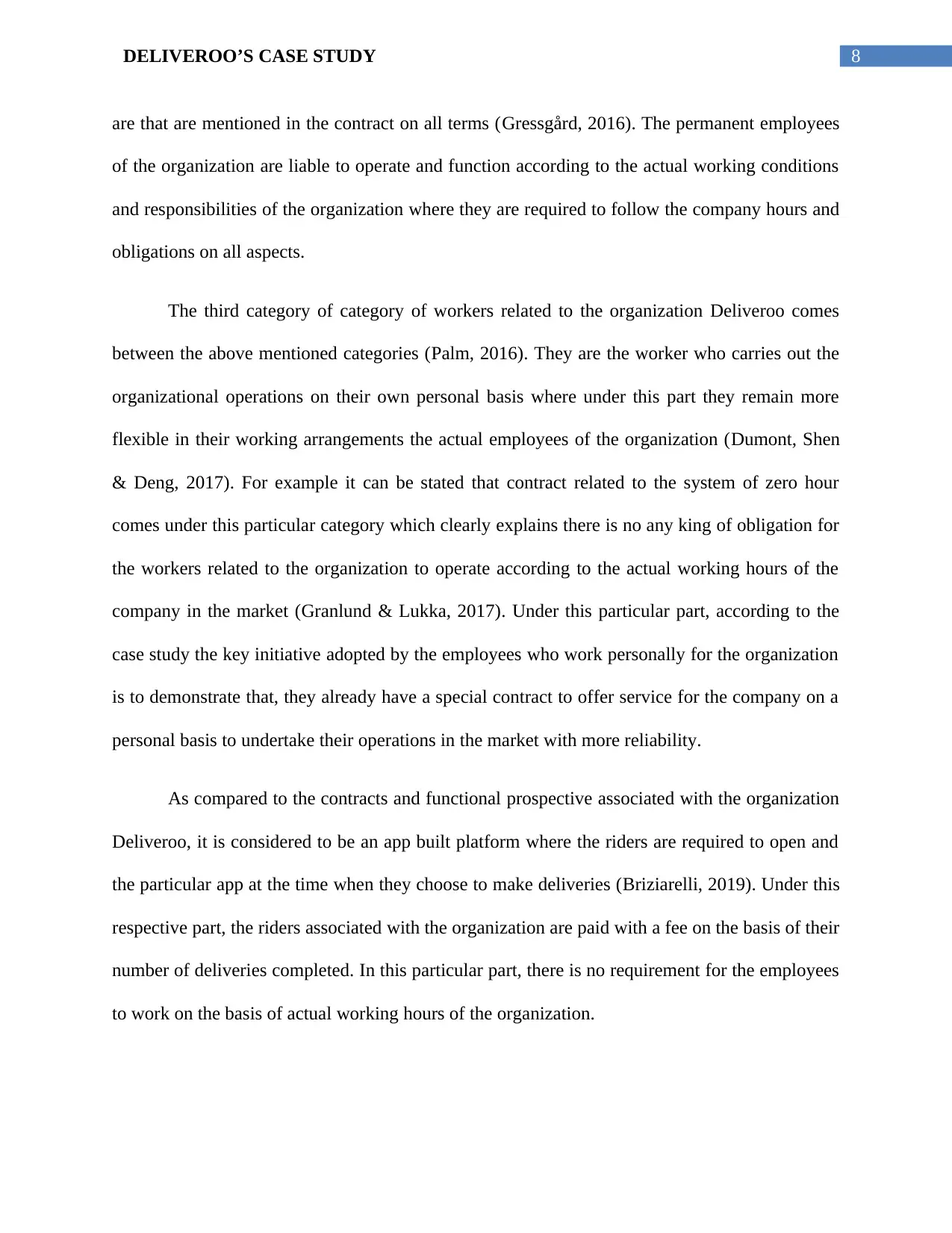
8DELIVEROO’S CASE STUDY
are that are mentioned in the contract on all terms (Gressgård, 2016). The permanent employees
of the organization are liable to operate and function according to the actual working conditions
and responsibilities of the organization where they are required to follow the company hours and
obligations on all aspects.
The third category of category of workers related to the organization Deliveroo comes
between the above mentioned categories (Palm, 2016). They are the worker who carries out the
organizational operations on their own personal basis where under this part they remain more
flexible in their working arrangements the actual employees of the organization (Dumont, Shen
& Deng, 2017). For example it can be stated that contract related to the system of zero hour
comes under this particular category which clearly explains there is no any king of obligation for
the workers related to the organization to operate according to the actual working hours of the
company in the market (Granlund & Lukka, 2017). Under this particular part, according to the
case study the key initiative adopted by the employees who work personally for the organization
is to demonstrate that, they already have a special contract to offer service for the company on a
personal basis to undertake their operations in the market with more reliability.
As compared to the contracts and functional prospective associated with the organization
Deliveroo, it is considered to be an app built platform where the riders are required to open and
the particular app at the time when they choose to make deliveries (Briziarelli, 2019). Under this
respective part, the riders associated with the organization are paid with a fee on the basis of their
number of deliveries completed. In this particular part, there is no requirement for the employees
to work on the basis of actual working hours of the organization.
are that are mentioned in the contract on all terms (Gressgård, 2016). The permanent employees
of the organization are liable to operate and function according to the actual working conditions
and responsibilities of the organization where they are required to follow the company hours and
obligations on all aspects.
The third category of category of workers related to the organization Deliveroo comes
between the above mentioned categories (Palm, 2016). They are the worker who carries out the
organizational operations on their own personal basis where under this part they remain more
flexible in their working arrangements the actual employees of the organization (Dumont, Shen
& Deng, 2017). For example it can be stated that contract related to the system of zero hour
comes under this particular category which clearly explains there is no any king of obligation for
the workers related to the organization to operate according to the actual working hours of the
company in the market (Granlund & Lukka, 2017). Under this particular part, according to the
case study the key initiative adopted by the employees who work personally for the organization
is to demonstrate that, they already have a special contract to offer service for the company on a
personal basis to undertake their operations in the market with more reliability.
As compared to the contracts and functional prospective associated with the organization
Deliveroo, it is considered to be an app built platform where the riders are required to open and
the particular app at the time when they choose to make deliveries (Briziarelli, 2019). Under this
respective part, the riders associated with the organization are paid with a fee on the basis of their
number of deliveries completed. In this particular part, there is no requirement for the employees
to work on the basis of actual working hours of the organization.
⊘ This is a preview!⊘
Do you want full access?
Subscribe today to unlock all pages.

Trusted by 1+ million students worldwide
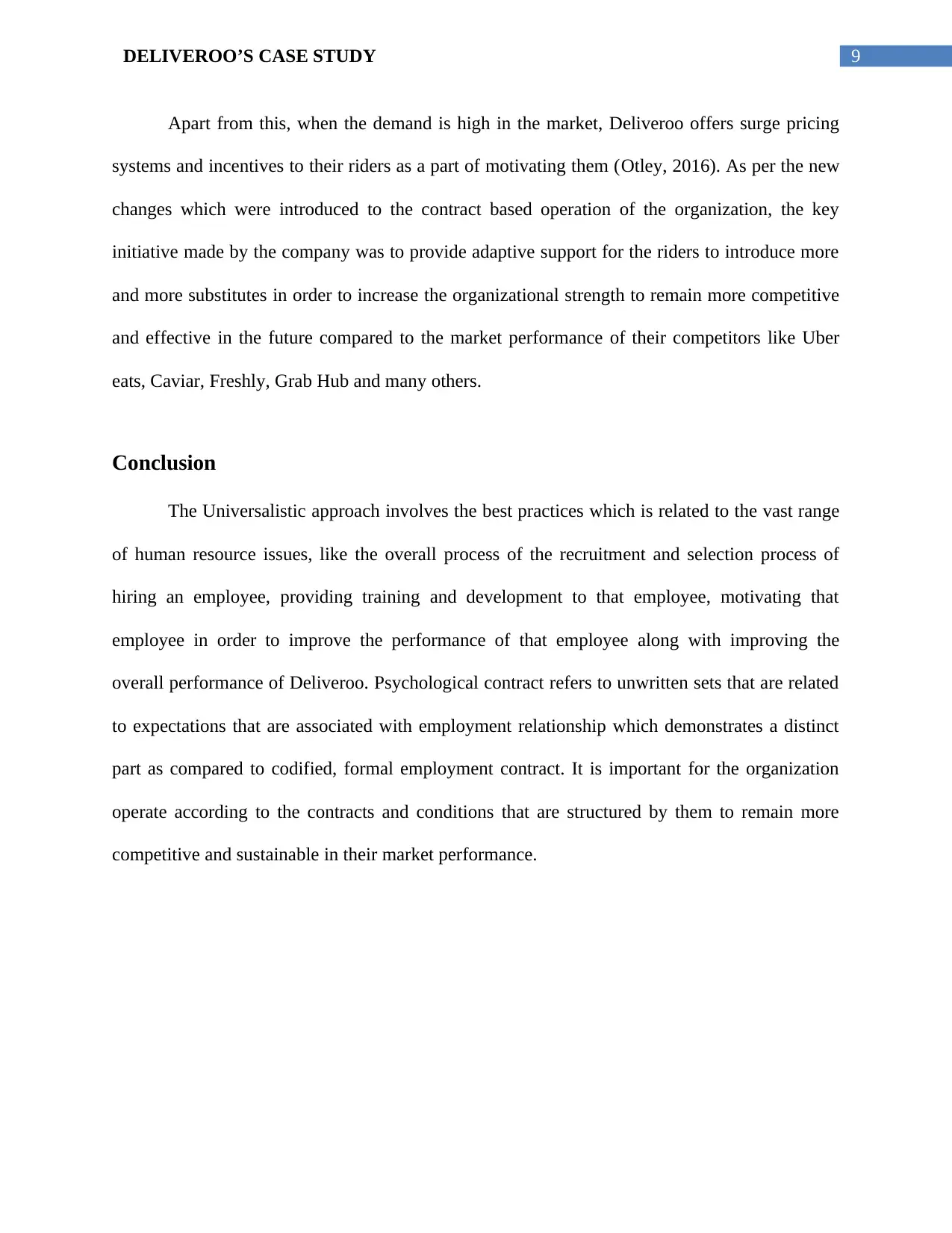
9DELIVEROO’S CASE STUDY
Apart from this, when the demand is high in the market, Deliveroo offers surge pricing
systems and incentives to their riders as a part of motivating them (Otley, 2016). As per the new
changes which were introduced to the contract based operation of the organization, the key
initiative made by the company was to provide adaptive support for the riders to introduce more
and more substitutes in order to increase the organizational strength to remain more competitive
and effective in the future compared to the market performance of their competitors like Uber
eats, Caviar, Freshly, Grab Hub and many others.
Conclusion
The Universalistic approach involves the best practices which is related to the vast range
of human resource issues, like the overall process of the recruitment and selection process of
hiring an employee, providing training and development to that employee, motivating that
employee in order to improve the performance of that employee along with improving the
overall performance of Deliveroo. Psychological contract refers to unwritten sets that are related
to expectations that are associated with employment relationship which demonstrates a distinct
part as compared to codified, formal employment contract. It is important for the organization
operate according to the contracts and conditions that are structured by them to remain more
competitive and sustainable in their market performance.
Apart from this, when the demand is high in the market, Deliveroo offers surge pricing
systems and incentives to their riders as a part of motivating them (Otley, 2016). As per the new
changes which were introduced to the contract based operation of the organization, the key
initiative made by the company was to provide adaptive support for the riders to introduce more
and more substitutes in order to increase the organizational strength to remain more competitive
and effective in the future compared to the market performance of their competitors like Uber
eats, Caviar, Freshly, Grab Hub and many others.
Conclusion
The Universalistic approach involves the best practices which is related to the vast range
of human resource issues, like the overall process of the recruitment and selection process of
hiring an employee, providing training and development to that employee, motivating that
employee in order to improve the performance of that employee along with improving the
overall performance of Deliveroo. Psychological contract refers to unwritten sets that are related
to expectations that are associated with employment relationship which demonstrates a distinct
part as compared to codified, formal employment contract. It is important for the organization
operate according to the contracts and conditions that are structured by them to remain more
competitive and sustainable in their market performance.
Paraphrase This Document
Need a fresh take? Get an instant paraphrase of this document with our AI Paraphraser
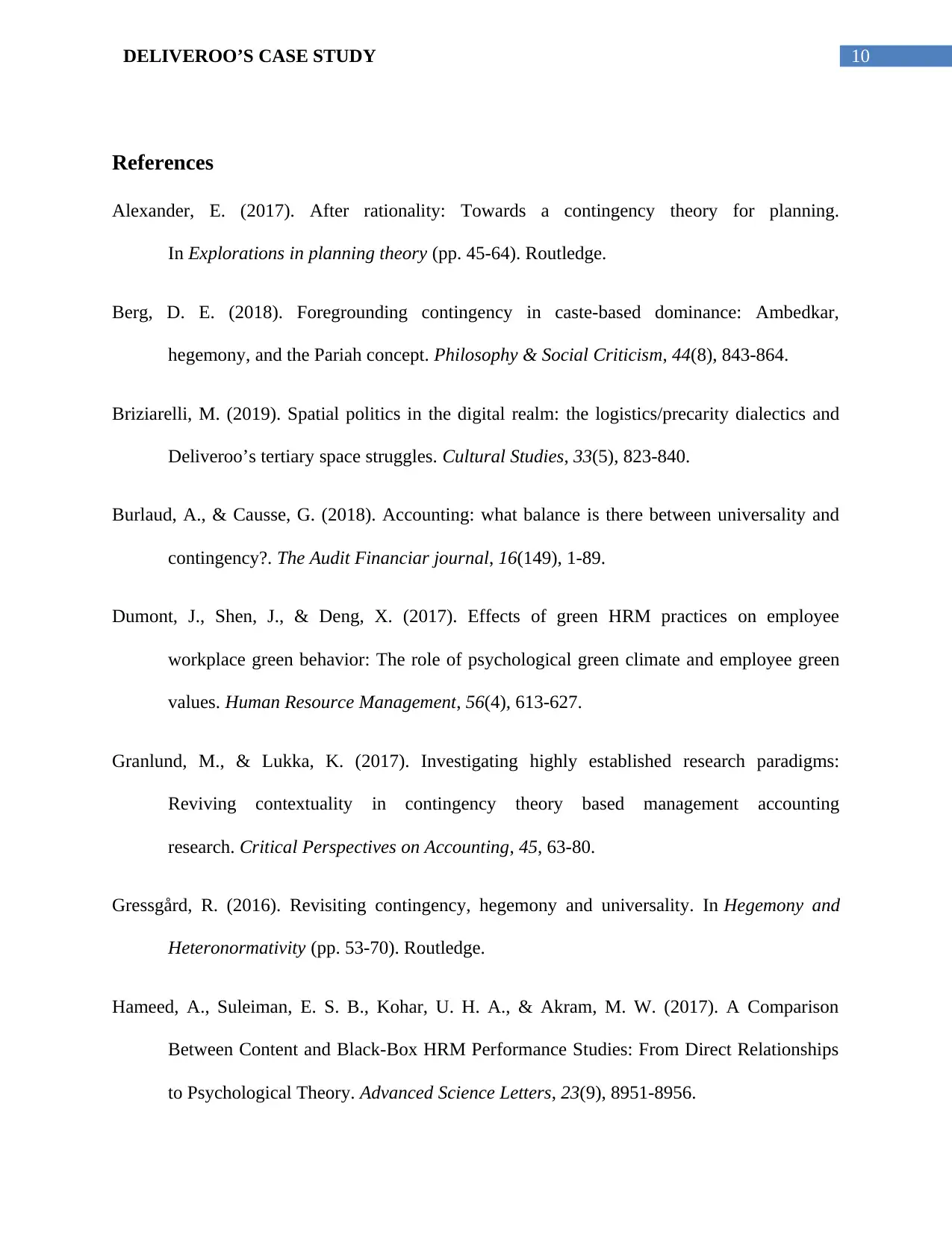
10DELIVEROO’S CASE STUDY
References
Alexander, E. (2017). After rationality: Towards a contingency theory for planning.
In Explorations in planning theory (pp. 45-64). Routledge.
Berg, D. E. (2018). Foregrounding contingency in caste-based dominance: Ambedkar,
hegemony, and the Pariah concept. Philosophy & Social Criticism, 44(8), 843-864.
Briziarelli, M. (2019). Spatial politics in the digital realm: the logistics/precarity dialectics and
Deliveroo’s tertiary space struggles. Cultural Studies, 33(5), 823-840.
Burlaud, A., & Causse, G. (2018). Accounting: what balance is there between universality and
contingency?. The Audit Financiar journal, 16(149), 1-89.
Dumont, J., Shen, J., & Deng, X. (2017). Effects of green HRM practices on employee
workplace green behavior: The role of psychological green climate and employee green
values. Human Resource Management, 56(4), 613-627.
Granlund, M., & Lukka, K. (2017). Investigating highly established research paradigms:
Reviving contextuality in contingency theory based management accounting
research. Critical Perspectives on Accounting, 45, 63-80.
Gressgård, R. (2016). Revisiting contingency, hegemony and universality. In Hegemony and
Heteronormativity (pp. 53-70). Routledge.
Hameed, A., Suleiman, E. S. B., Kohar, U. H. A., & Akram, M. W. (2017). A Comparison
Between Content and Black-Box HRM Performance Studies: From Direct Relationships
to Psychological Theory. Advanced Science Letters, 23(9), 8951-8956.
References
Alexander, E. (2017). After rationality: Towards a contingency theory for planning.
In Explorations in planning theory (pp. 45-64). Routledge.
Berg, D. E. (2018). Foregrounding contingency in caste-based dominance: Ambedkar,
hegemony, and the Pariah concept. Philosophy & Social Criticism, 44(8), 843-864.
Briziarelli, M. (2019). Spatial politics in the digital realm: the logistics/precarity dialectics and
Deliveroo’s tertiary space struggles. Cultural Studies, 33(5), 823-840.
Burlaud, A., & Causse, G. (2018). Accounting: what balance is there between universality and
contingency?. The Audit Financiar journal, 16(149), 1-89.
Dumont, J., Shen, J., & Deng, X. (2017). Effects of green HRM practices on employee
workplace green behavior: The role of psychological green climate and employee green
values. Human Resource Management, 56(4), 613-627.
Granlund, M., & Lukka, K. (2017). Investigating highly established research paradigms:
Reviving contextuality in contingency theory based management accounting
research. Critical Perspectives on Accounting, 45, 63-80.
Gressgård, R. (2016). Revisiting contingency, hegemony and universality. In Hegemony and
Heteronormativity (pp. 53-70). Routledge.
Hameed, A., Suleiman, E. S. B., Kohar, U. H. A., & Akram, M. W. (2017). A Comparison
Between Content and Black-Box HRM Performance Studies: From Direct Relationships
to Psychological Theory. Advanced Science Letters, 23(9), 8951-8956.
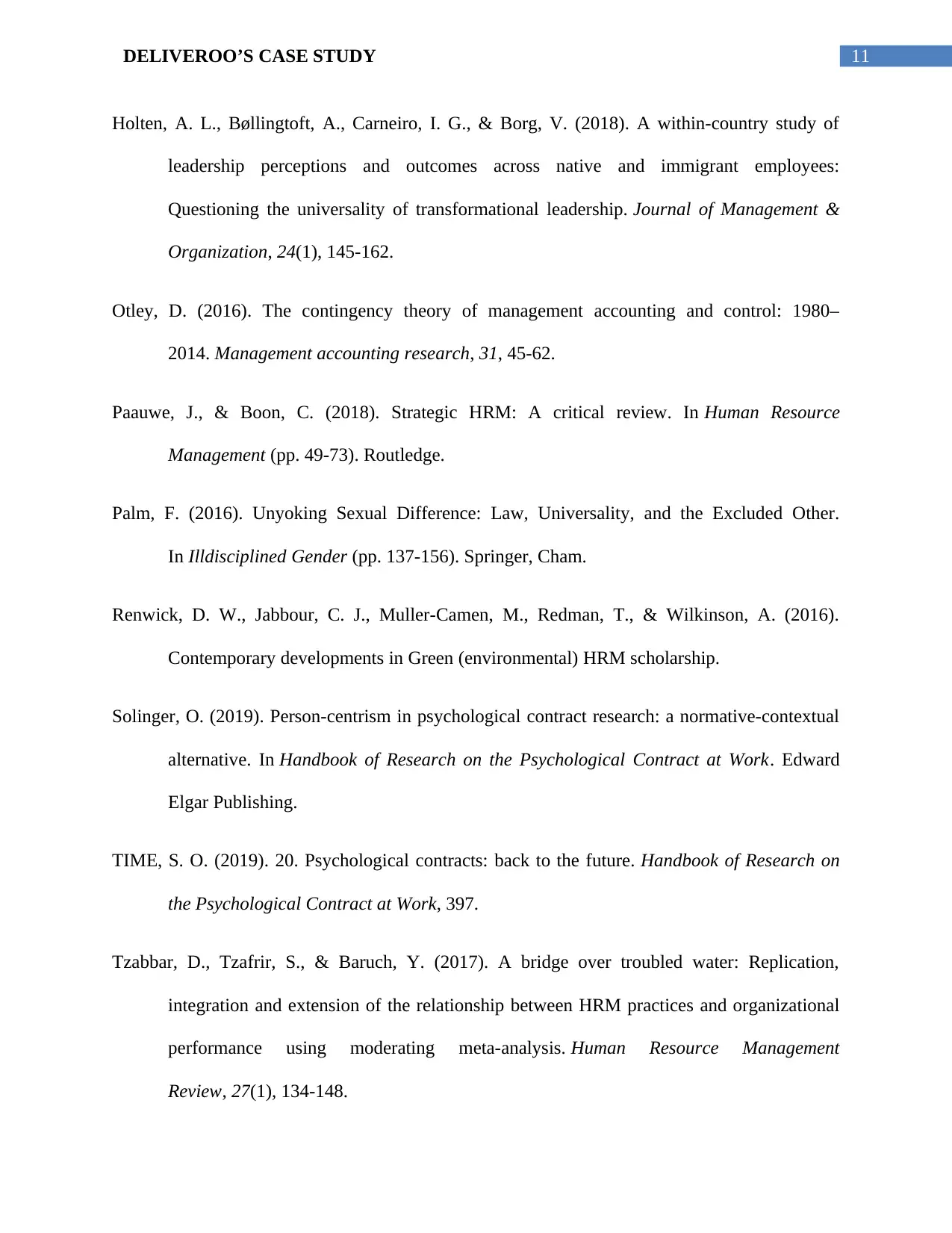
11DELIVEROO’S CASE STUDY
Holten, A. L., Bøllingtoft, A., Carneiro, I. G., & Borg, V. (2018). A within-country study of
leadership perceptions and outcomes across native and immigrant employees:
Questioning the universality of transformational leadership. Journal of Management &
Organization, 24(1), 145-162.
Otley, D. (2016). The contingency theory of management accounting and control: 1980–
2014. Management accounting research, 31, 45-62.
Paauwe, J., & Boon, C. (2018). Strategic HRM: A critical review. In Human Resource
Management (pp. 49-73). Routledge.
Palm, F. (2016). Unyoking Sexual Difference: Law, Universality, and the Excluded Other.
In Illdisciplined Gender (pp. 137-156). Springer, Cham.
Renwick, D. W., Jabbour, C. J., Muller-Camen, M., Redman, T., & Wilkinson, A. (2016).
Contemporary developments in Green (environmental) HRM scholarship.
Solinger, O. (2019). Person-centrism in psychological contract research: a normative-contextual
alternative. In Handbook of Research on the Psychological Contract at Work. Edward
Elgar Publishing.
TIME, S. O. (2019). 20. Psychological contracts: back to the future. Handbook of Research on
the Psychological Contract at Work, 397.
Tzabbar, D., Tzafrir, S., & Baruch, Y. (2017). A bridge over troubled water: Replication,
integration and extension of the relationship between HRM practices and organizational
performance using moderating meta-analysis. Human Resource Management
Review, 27(1), 134-148.
Holten, A. L., Bøllingtoft, A., Carneiro, I. G., & Borg, V. (2018). A within-country study of
leadership perceptions and outcomes across native and immigrant employees:
Questioning the universality of transformational leadership. Journal of Management &
Organization, 24(1), 145-162.
Otley, D. (2016). The contingency theory of management accounting and control: 1980–
2014. Management accounting research, 31, 45-62.
Paauwe, J., & Boon, C. (2018). Strategic HRM: A critical review. In Human Resource
Management (pp. 49-73). Routledge.
Palm, F. (2016). Unyoking Sexual Difference: Law, Universality, and the Excluded Other.
In Illdisciplined Gender (pp. 137-156). Springer, Cham.
Renwick, D. W., Jabbour, C. J., Muller-Camen, M., Redman, T., & Wilkinson, A. (2016).
Contemporary developments in Green (environmental) HRM scholarship.
Solinger, O. (2019). Person-centrism in psychological contract research: a normative-contextual
alternative. In Handbook of Research on the Psychological Contract at Work. Edward
Elgar Publishing.
TIME, S. O. (2019). 20. Psychological contracts: back to the future. Handbook of Research on
the Psychological Contract at Work, 397.
Tzabbar, D., Tzafrir, S., & Baruch, Y. (2017). A bridge over troubled water: Replication,
integration and extension of the relationship between HRM practices and organizational
performance using moderating meta-analysis. Human Resource Management
Review, 27(1), 134-148.
⊘ This is a preview!⊘
Do you want full access?
Subscribe today to unlock all pages.

Trusted by 1+ million students worldwide
1 out of 13
Related Documents
Your All-in-One AI-Powered Toolkit for Academic Success.
+13062052269
info@desklib.com
Available 24*7 on WhatsApp / Email
![[object Object]](/_next/static/media/star-bottom.7253800d.svg)
Unlock your academic potential
Copyright © 2020–2026 A2Z Services. All Rights Reserved. Developed and managed by ZUCOL.





